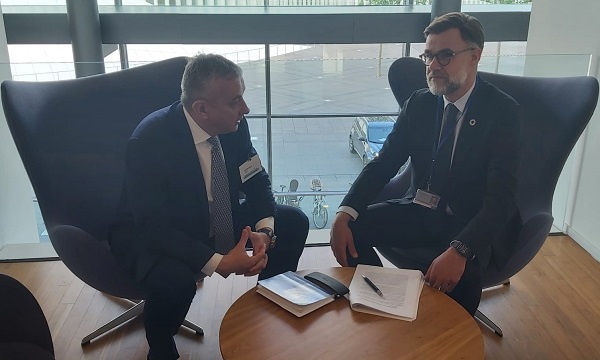 L-R: Jozef Síkela, Czech Minister of Industry and Trade; Franz Fayot, Luxembourg's Minister of the Economy;
Credit: MECO
L-R: Jozef Síkela, Czech Minister of Industry and Trade; Franz Fayot, Luxembourg's Minister of the Economy;
Credit: MECO
Luxembourg's Minister of the Economy, Franz Fayot, took part in the meeting of the European Union (EU) Competitiveness Council, which took place in Luxembourg on Thursday 9 June 2022 under the French Presidency.
EU Economy Ministers discussed concrete actions to increase the resilience of European industry in the current context of health, climate and geopolitical crises.
Following the outbreak of war in Ukraine, the vulnerabilities of EU supply chains have been further exposed. It is in this context that the strengthening of the EU's strategic autonomy, particularly at the level of critical raw materials, was the subject of a debate between the ministers, including how best to support European companies in this context.
More specifically, the ministers had the opportunity to discuss the European Chips Act initiative proposed by the European Commissioner for the Internal Market, Thierry Breton. This legislative text provides for investments of €43 billion to strengthen the design and production capacities of semiconductors in Europe. Like the COVID-19 pandemic, during which the European Commission organised the centralised purchase and distribution of vaccines, the Chips Act contains similar measures to anticipate and act in the face of a shortage of microchips.
Minister Fayot emphasised the importance of guaranteeing cross-border, united and non-discriminatory access to semiconductors in times of crisis for all EU countries. "Above all, let's avoid falling back into the protectionism observed during the pandemic. The resilience of European industry, including for chips, must be based on an internal market without borders and on solidarity between all the member countries", Luxembourg's Economy Minister stated. He also highlighted Luxembourg's support for the objectives of the Chips Act while recalling that the planned actions should allow all companies, and in particular small and medium-sized enterprises (SMEs) and startups, to benefit from the planned actions.
It is precisely the internal market, and its role in the ecological transition of the EU, which was the subject of a debate at the ministerial lunch, during which Minister Fayot emphasised that the EU must equip itself with harmonised rules and applied uniformly to all member countries to achieve the objective of climate neutrality by 2050. He stated: "Every barrier within the internal market should be considered as a crisis. Innovative technologies central to Europe's green transition must be able to flow freely across borders to achieve critical mass. Europe must play a leading role in the development of harmonized standards that encourage the transition to more sustainable, leaner production and consumption".
Finally, during a bilateral meeting with his Czech counterpart, Jozef Sikela, Luxembourg's Economy Minister had the opportunity to discuss the priorities of the future Czech Presidency of the Council of the EU, which will begin on 1 July 2022. During their meeting, the ministers were able to note their respective attachment to the proper functioning of the internal market, which they deemed essential for strengthening the resilience of the European economy.








